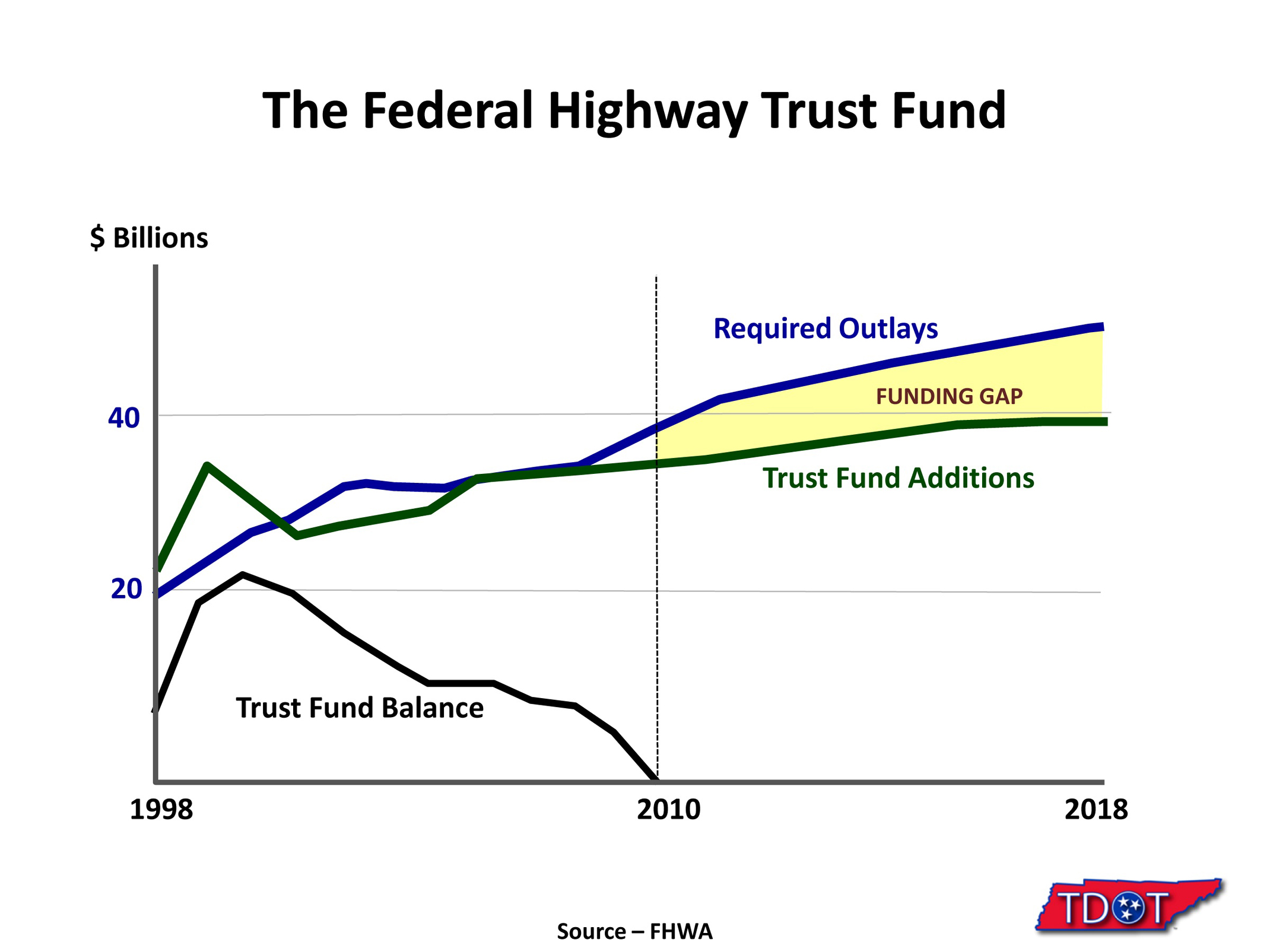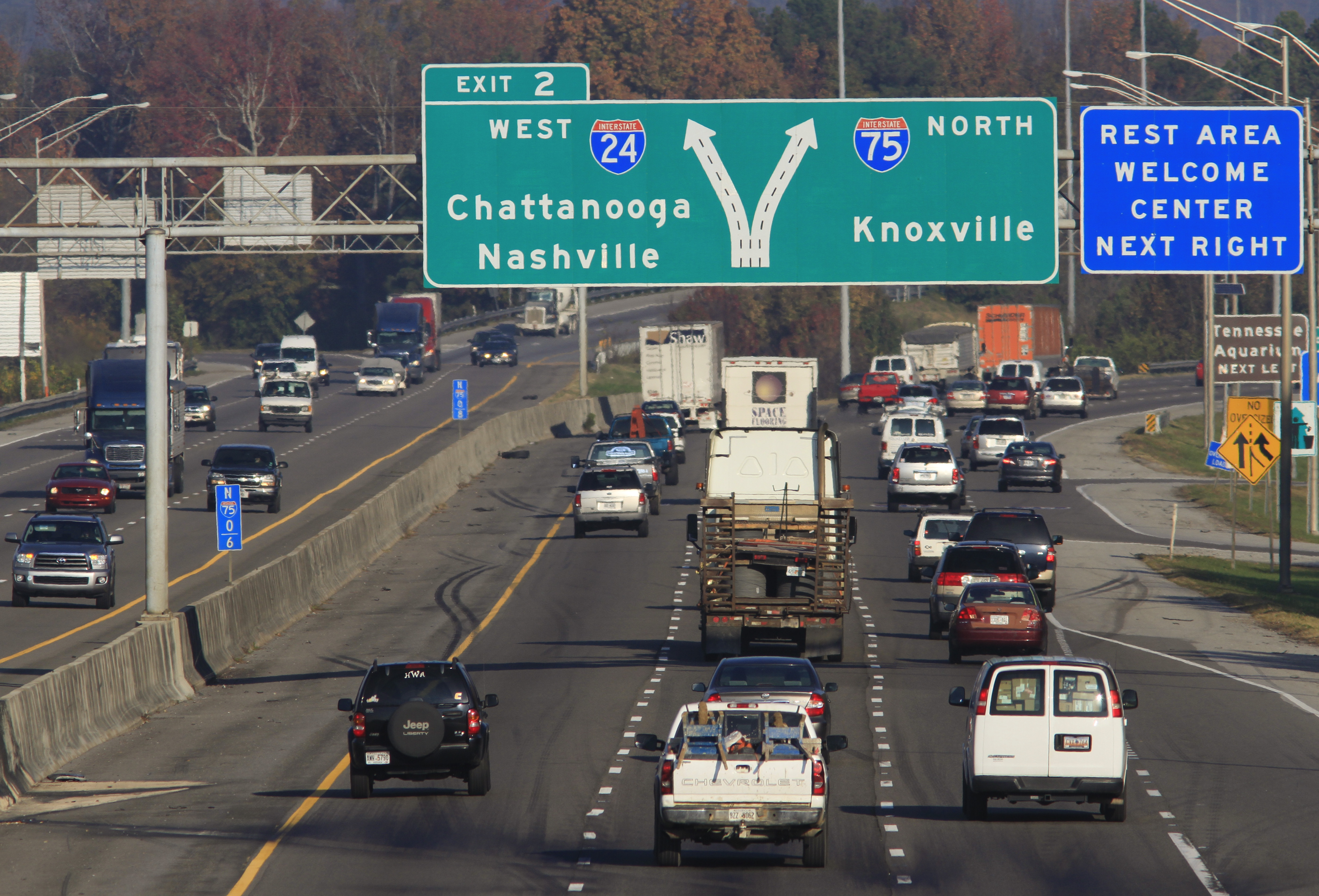BY THE NUMBERS$1.75 billion: TDOT 2012-13 budget$892 million: Federal funds$818 million: State funds$42 million: Other fundsFUEL TAXESFederal gasoline tax: 18.4 cents per gallonFederal diesel tax: 24.4 cents per gallonTennessee gas tax: 21.4 cents per gallonSource: TDOT
Millions of dollars in needed local road projects - from fixing the Interstate 75/24 split to the downtown phase of the U.S. Highway 27 rebuild - depend on funding guarantees that aren't there.
State Transportation Commissioner John Schroer, speaking last week in Chattanooga, compared state and national infrastructure needs to a house with a leaky roof: A small drip, ignored, can bring down the structure given time.
"We're at that stage in our national infrastructure," Schroer said.
"Back in the late '90s, early 2000s, TDOT had basically all the money in the world to do everything it wanted to," he said, but eroding revenues from the federal fuel tax that funds most highway projects and Congress' inability to pass a long-range transportation bill has created "a national crisis."
"I think Congress ought to talk about new ways of funding transportation," he said, perhaps including a concept widely discussed around the nation -- taxing miles that people travel rather than the gallons of fuel they buy.
Some local leaders want to find new funding methods, too.
"We have to find a replacement," said Chattanooga Mayor Ron Littlefield, who is trained as an urban planner. "It probably will involve more toll costs and other ways to have those who use the highways and roads infrastructure to pay the costs.
"It will not be painless; there is no easy political out," he said. "No one wants to pay for it, but these things are not cheap, and while that's happening, the rest of the infrastructure is aging and falling apart."
County Mayor Jim Coppinger agreed, saying lack of funding "impacts their ability to do all the projects."
Just last week, state and local transportation planners held public discussions about the maintenance needs on Signal Mountain Boulevard. Water runoff and unstable rock are perennial problems for mountain roads -- in 2009, a section of the boulevard's southbound lane fell off into the Tennessee River Gorge, and the highway was closed for weeks.
Also last week, planners discussed the I-75/24 split, where aging bridges are functionally obsolete and suffering the effects of carrying thousands of multi-ton vehicles each day.
The traffic lanes were designed for slower speeds and smaller loads, which contributes to frequent truck turnovers, officials said. The 1960s design of the Ringgold Road cloverleaf and access to the Tennessee Welcome Center also throw speeding and slowing vehicles into the same lanes, resulting in frequent crashes.
It's the same statewide, Schroer said. TDOT has $10 billion worth of projects -- $700 million in Hamilton County alone -- and just $900 million of that is for new construction.
He and others said it's going to take a federal solution, and he's betting the feds will switch from taxing gasoline to taxing travel.
Taxing by the mile
Federal gas tax revenue fluctuates. People drive less when the economy is bad, and switching to more fuel-efficient cars means they buy less gas.
Advocates of taxing people by the number of miles they drive -- measured by GPS device -- say such a method would ensure that hybrid and electric-vehicle users would also contribute to road building and maintenance.
"We like to think of it like your water bill, your sewer bill and your gas bill -- you pay for what you use," Schroer said.
The new chairman of the finance and administration committee of the American Association of State Highway Transportation Officials, known as AASHTO, Schroer said the organization may try to develop legislation offering new transportation funding solutions that Congress could receive as a bipartisan compromise.
Some area state lawmakers said the solution -- especially taxing miles traveled rather than gasoline burned -- must come from Congress.
"Especially in Southeast Tennessee, we would need that to be federal rather than state -- we would just drive our consumers across the state line to Georgia," said state Rep. Vince Dean, R-East Ridge, who sits on the House Transportation Committee.
Dean said he's well aware of the maintenance and infrastructure needs on state highways.
"We've moved from a department of transportation to a department of maintenance. If we don't do something, we're going to be a department of emergencies," he said.
U.S. Sens. Bob Corker and Lamar Alexander and U.S. Rep. Chuck Fleischmann, all Republicans, each said in statements that they see the need for better transportation funding and planning.
Fleischmann said that this year he supported a five-year transportation bill funded by gas taxes and royalties from new energy exploration.
"Not only was the bill fully paid for, but the additional energy exploration would create thousands of jobs while lowering gas prices for working families," his statement said. "This bill contained the right solutions to address our transportation needs, and I look forward to supporting similar legislation which addresses our long-term needs while being fully paid for," he said.
Corker said he is working toward a solution but isn't ready to offer specifics.
Tennessee House Majority Leader Gerald McCormick, a Chattanooga Republican, said a mileage tax "may be something we have to look at down the line. Either that or take money from the general fund, which we would be hesitant to do."
McCormick said a state tax increase to fund transportation is unlikely.
"The people I talk to don't feel they are undertaxed," he said. "If the federal government got their act together and came up with more of a long-range plan and asked us to help fund it. ... Maybe that does give us the ability to go to people and say, 'Here's the plan, here's how much it's going to cost, and if it's worth it to you, we may ask you to help fund it.'"

